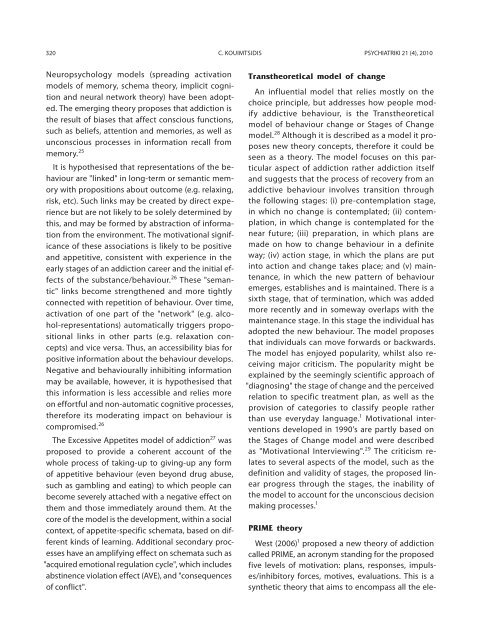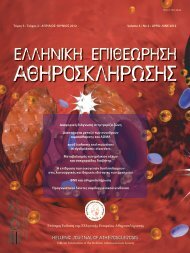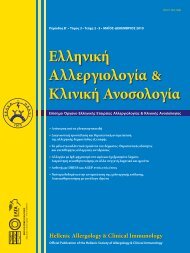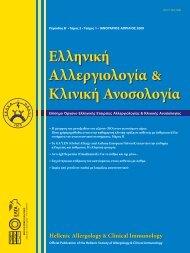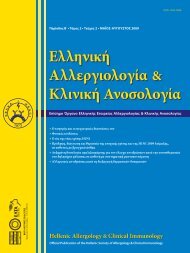ÏÏ ÏιαÏÏικη - ÎÎΤΠÎαÏÏικÎÏ ÎκδÏÏειÏ
ÏÏ ÏιαÏÏικη - ÎÎΤΠÎαÏÏικÎÏ ÎκδÏÏειÏ
ÏÏ ÏιαÏÏικη - ÎÎΤΠÎαÏÏικÎÏ ÎκδÏÏειÏ
- No tags were found...
You also want an ePaper? Increase the reach of your titles
YUMPU automatically turns print PDFs into web optimized ePapers that Google loves.
320 C. Kouimtsidis PSYCHIATRIKI 21 (4), 2010Neuropsychology models (spreading activationmodels of memory, schema theory, implicit cognitionand neural network theory) have been adopted.The emerging theory proposes that addiction isthe result of biases that affect conscious functions,such as beliefs, attention and memories, as well asunconscious processes in information recall frommemory. 25It is hypothesised that representations of the behaviourare "linked" in long-term or semantic memorywith propositions about outcome (e.g. relaxing,risk, etc). Such links may be created by direct experiencebut are not likely to be solely determined bythis, and may be formed by abstraction of informationfrom the environment. The motivational significanceof these associations is likely to be positiveand appetitive, consistent with experience in theearly stages of an addiction career and the initial effectsof the substance/behaviour. 26 These "semantic"links become strengthened and more tightlyconnected with repetition of behaviour. Over time,activation of one part of the "network" (e.g. alcohol-representations)automatically triggers propositionallinks in other parts (e.g. relaxation concepts)and vice versa. Thus, an accessibility bias forpositive information about the behaviour develops.Negative and behaviourally inhibiting informationmay be available, however, it is hypothesised thatthis information is less accessible and relies moreon effortful and non-automatic cognitive processes,therefore its moderating impact on behaviour iscompromised. 26The Excessive Appetites model of addiction 27 wasproposed to provide a coherent account of thewhole process of taking-up to giving-up any formof appetitive behaviour (even beyond drug abuse,such as gambling and eating) to which people canbecome severely attached with a negative effect onthem and those immediately around them. At thecore of the model is the development, within a socialcontext, of appetite-specific schemata, based on differentkinds of learning. Additional secondary processeshave an amplifying effect on schemata such as"acquired emotional regulation cycle", which includesabstinence violation effect (AVE), and "consequencesof conflict".Transtheoretical model of changeAn influential model that relies mostly on thechoice principle, but addresses how people modifyaddictive behaviour, is the Transtheoreticalmodel of behaviour change or Stages of Changemodel. 28 Although it is described as a model it proposesnew theory concepts, therefore it could beseen as a theory. The model focuses on this particularaspect of addiction rather addiction itselfand suggests that the process of recovery from anaddictive behaviour involves transition throughthe following stages: (i) pre-contemplation stage,in which no change is contemplated; (ii) contemplation,in which change is contemplated for thenear future; (iii) preparation, in which plans aremade on how to change behaviour in a definiteway; (iv) action stage, in which the plans are putinto action and change takes place; and (v) maintenance,in which the new pattern of behaviouremerges, establishes and is maintained. There is asixth stage, that of termination, which was addedmore recently and in someway overlaps with themaintenance stage. In this stage the individual hasadopted the new behaviour. The model proposesthat individuals can move forwards or backwards.The model has enjoyed popularity, whilst also receivingmajor criticism. The popularity might beexplained by the seemingly scientific approach of"diagnosing" the stage of change and the perceivedrelation to specific treatment plan, as well as theprovision of categories to classify people ratherthan use everyday language. 1 Motivational interventionsdeveloped in 1990’s are partly based onthe Stages of Change model and were describedas "Motivational Interviewing". 29 The criticism relatesto several aspects of the model, such as thedefinition and validity of stages, the proposed linearprogress through the stages, the inability ofthe model to account for the unconscious decisionmaking processes. 1PRIME theoryWest (2006) 1 proposed a new theory of addictioncalled PRIME, an acronym standing for the proposedfive levels of motivation: plans, responses, impulses/inhibitoryforces, motives, evaluations. This is asynthetic theory that aims to encompass all the ele-


